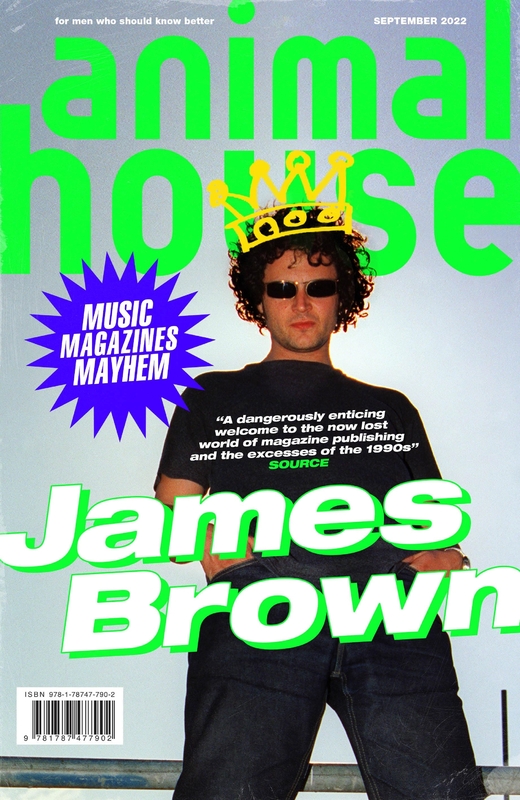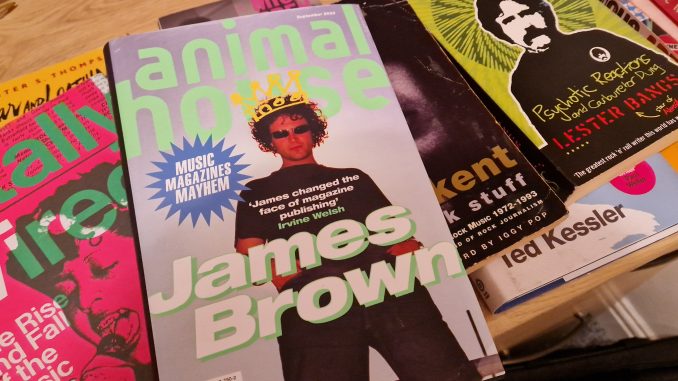
The hedonistic story of James Brown, journalist, music lover and irreverent lad. From Attack on Bazag, through the NME, to Loaded and beyond.
Confucius, or more likely Mark Twain, once said, “If you find a job you like doing, you’ll never work a day in your life”. On that basis, James Brown has not worked a day since leaving school.
As a teen he had his own zine, Attack on Bazag. By the age of twenty two he was features editor of the New Musical Express and at the ripe old age of twenty seven he launched Loaded, a magazine that gave the publishing world such a kick up the arse it hasn’t been able to sit down properly since.
In the first few chapters he jumps back and fore mixing anecdotes from his career, such as tripping on acid at an awards ceremony, to tales from what he describes as his ‘first childhood’. It is done seamlessly, giving us an taste of his formative years and simultaneously quenching the thirst of those of us keen to drink in his anecdotes about Pop Will Eat Itself, The Three Johns and The Redskins.
There seems to have been a lot of love about in his childhood, despite there being mental health issues and divorce. He was encouraged to write by his dad, and some of his teachers, but not all. His PE teacher doubted he would amount to anything in life. But hey, he was a PE teacher. Pots, kettles and all that jazz.
His careers teacher advised him he needed qualifications in both music and English if he wanted to be a music journalist. He disagreed, believing he only need an ability to write and a knowledge of the music he was writing about. He had both, and time would prove one of them to be wrong. Very wrong.
The ashes of his school tie were still smoldering when he progressed from knocking out fanzines, to writing for Sounds. He wasn’t there long though: the NME came calling, and when his old school mates were donning caps and gowns to pick up their degrees in Music and English, he was writing the words ‘Features Editor for the world’s best music weekly’, on his curriculum vitae.
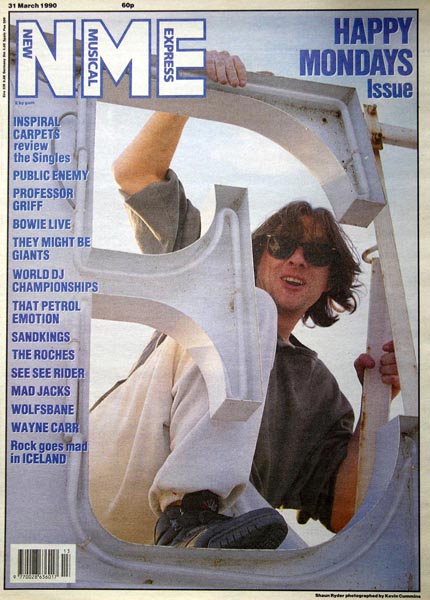
Whilst James is best known for Loaded, it is from the NME that I know him best. I was a regular reader of the NME from the late seventies till long after it ceased to be relevant, some time in the naughties. I was a loyalist. I rarely bought Melody Maker or Sounds. Smash Hits? Leave it out!
I was often late for work on Thursdays if the paper boy was late.
We get anecdotes about hanging out with the KLF in Sweden, the Beastie Boys in America and the Happy Mondays in Brazil. Bands like The Cult, The Three Johns and Gaye Bykers on Acid get mentions, prompting nostalgic grins from readers like me that were also going to see the same bands and buying the same records during this time.
Basically, he was listening to great music, hanging out with pop stars, footballers and comedians, writing about his exploits, and getting paid for it. On the coolest music weekly in the world. For some people, that’s the equivalent of playing centre forward for their favourite football team, playing lead guitar for their favourite band or being a test driver for your favourite sports car manufacturer. James is one of those people.
He doesn’t stand outside looking on admiringly though, he kicks open the backstage door and gets wasted with the best/worst of them. He embraces the concept of gonzo journalism, like his influences, Hunter S Thompson, Tom Woolfe and Nick Kent.
A dream job like this comes at a cost though. The partaking of indulgences that often goes hand in hand with rock and roll can lead to habits that are detrimental to health. And sanity. He is quite open throughout about his recreational refreshments of choice and some of the comical capers that resulted. And the less comical consequences.
It all takes its toll and eventually he exits the NME for pastures new, leaving the NME with a circulation fifty thousand copies a week healthier than when he joined the paper. At that point he had no idea what he wanted to do, except get loaded and have a good time. This ‘intermission’ between jobs became his late onset ‘gap year’. He rediscovered his love of music, reconnected with smaller music venues, hung out with the Reeves guy that was in the Matrix and the one that was partnered with Bob Mortimer, and went clubbing. His writing was still much in demand though and he still knocked out the occasional article for the likes of the Times. As you do.
He briefly managed the band Fabulous, and spent a lot of time in America but eventually was invited to an interview for the job of editor of the NME. He didn’t get the job but was offered his own magazine as an alternative. A magazine that featured all the things he was interested in. Music, football, crisps, football, movies, travel, football and music. Loaded.
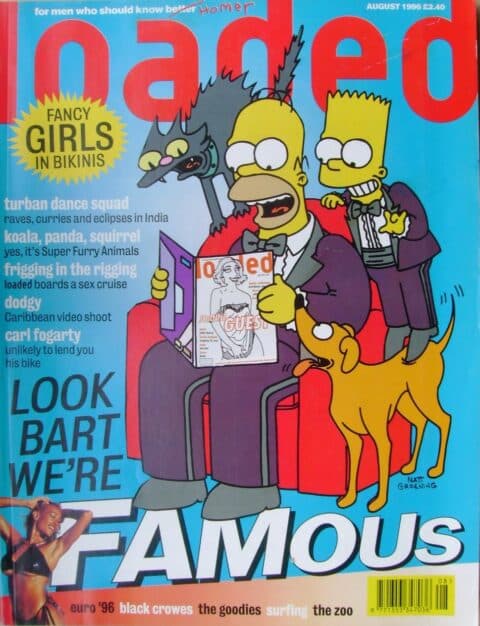
From the word go, Loaded simultaneously broke the mold and set the standard for others to follow. To a certain extent it reflected the times: Brit Pop, post-rave, indie/dance crossovers, the Premier League, new drugs, Trainspotting, the internet, cheap flights and post yuppie ‘new men’. But some would argue it didn’t just reflect the world around them. Just like the ‘New Journalists’ of the sixties and seventies, they became the news. In a very short space of time Loaded went from being a magazine that the industry thought was a joke, to selling half a million copies an issue. Industry experts predicted it would only start making a profit after three years. In reality, it took them twelve weeks. It was read by coppers and criminals, barristers, footballers and politicians. It was read by squaddies and even members of the Mujahideen.
It was read by ‘men who should know better’.
If you have a magazine with free rein to write about what you want, what would you do? Personally I’d travel the world having jolly japes and write about it. James clearly had similar thoughts, and we get tales of misadventures in hotels, on planes and in caves.
James wasn’t flying solo though. He recruited a band of like-minded reprobates and cunning linguists to document the mayhem. There were brilliant staff writers along with columnists like Irvine Welsh and Howard Marks. Along the way they dream up genius headlines like ‘Fifty ways to lose your liver’, ‘Chocolate and the Charlie factory’ and ‘Sushi and the van keys’.
For three years the Loaded team lived the dream. But eventually, to cut a long story short (and to not give away the whole plot), James was made an offer he couldn’t refuse and found himself darkening the door of GQ, which was in need of a good shake up. And a good shake up it got. The readership of GQ increased, James’s salary increased and, perhaps more importantly, his new employer recognised he needed something and was prepared to pay for it. Help with his appetite for destruction.
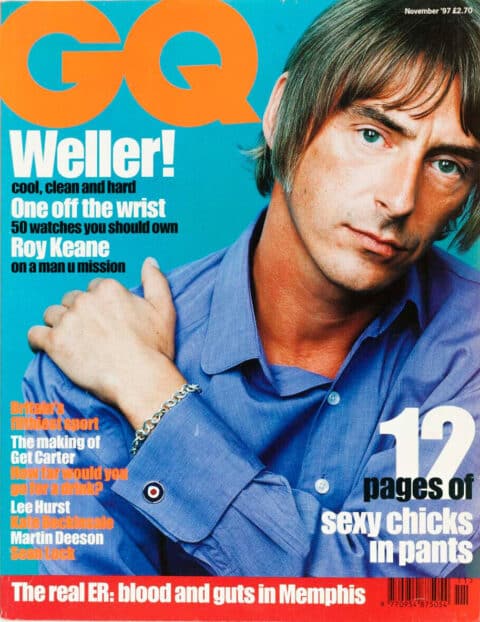
His writing about his battle with drink and drugs is open, brutally honest and thought-provoking. Not to mention hard for him to talk about.
His stay with GQ is cut short, through no fault of his own as it happens, but as a friend of his said at the time, “Tarantino was never going to last very long in Disneyland”.
The last few chapters skip through the first two decades of the twenty first century, not because he did nothing, he launched magazines and websites that mere mortals would be proud of. And became a dad and sobered up. There might be another book there at some time. Tantalisingly he does hint that there might be another book of rock and roll tales from back in the day because, although there is a lot jammed into this book, he only skims the surface.
He hasn’t lost his thirst for rock and roll, although where he once travelled in the back of transit vans on tour with post-punk indie trailblazers, he is now in a position to blagg flights and hotels and free tickets to catch the biggest bands on the planet, on the other side of the world.
These days he doesn’t seem to need to look for gainful employment, he has made so many connections the phone regularly rings with people looking to drink from the James Brown fountain, whether it be writing or advice. Even Madonna has cold-called him wanting access to his little black book.
Of course, none of this would have fallen together if James didn’t have the gift for sticking all the right words in the right order. Animal House is an easy read that flows naturally and has the basic ingredient. You want to finish the page, then turn over and read the next page. And the next. He doesn’t try to be clever, it just comes over like someone talking to you down the pub about stuff they are passionate about. If you are passionate about the same things, like we are, it’s win win.
Nothing is taken too seriously and he does not suffer fakers easily. These days he’s a bit more business-savy than your average zinester but, as is the way with any successful creative type, it only works if you are ‘for real’ and the ‘art’ comes first and foremost. James’ passion oozes from every page.
Despite all the fame and glamour, and this books being available in all good book shops, James appears to be still down to earth and doing what he did forty years ago. Where once he posted out zines from a pile in his bedroom, he now has a pile of this book in his bedroom. He signs them on request then walks down the post office to post himself. Do yourself a favour and buy a copy.
Or, failing that, buy the Audio book, which he eloquently reads himself. It’s the first one I’ve listened to where the author bursts out laughing, remembering the times he’s writing about. You will laugh with him.
